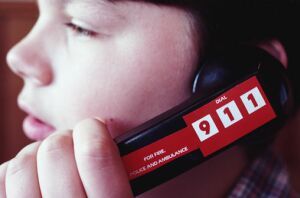Why Can't 911 Take Texts?
As the “East Coast Rapist” attacked two of her friends in the woods in Prince William County, the teenager knew that if she tried to make a call from her cellphone, the man would hear her voice and things would get even worse. But she had to get help.
She pulled out her cell and started thumbing.
“911 .?.?. pls noww man with gun, ” she wrote in a text message. The urgent plea went out to her mother, father and four friends. But emergency dispatchers at the 911 call center never got it. The emergency line is not equipped for text messaging.
The growth of technology has left 911 behind. Although people can send a text to vote for the next American Idol, they can’t send one to report the East Coast Rapist in Prince William or anywhere else.
Modernizing 911 has taken on renewed urgency as the 10th anniversary of the Sept. 11 terrorist attacks approaches, but actual progress is slow and could be years away in many places. That has prompted questions about how much improvement there has been in public safety communications in the past decade.
Federal and local officials readily acknowledge the need to modernize 911 calls, and they have taken small steps to digitize, but there are no plans in place for how to pay the billions of dollars the upgrade will cost and no timetable has been set.
“The thinking is, ‘I can text almost everyone — why can’t I text 911?’ ” said Jeffrey Horwitz of the Arlington County emergency communications center, which recently completed a $38 million upgrade in anticipation of moving to a digital 911 network. “We need to evolve as the technology evolves.”
Consumer expectation has already outpaced 911 capabilities. When Verizon Wireless customers send a text message to 911, they get this reply: “Please make a voice call to 911.” Other simple actions, including sending 911 a smartphone photo of a car speeding from a robbery, are also impossible.
For decades, almost all of the calls to the nation’s emergency number came from land lines. But now, about 70 percent of the 240 million 911 calls received each year come from wireless phones, according to the Arlington-based National Emergency Number Association.
The Federal Communications Commission, which regulates the 911 number, has taken some steps to improve the system. It asked for public comments on a digitized 911 and is reviewing those comments. FCC officials say they plan to propose rules this year on how to begin the upgrade.
“The shift that we need to make from analog to digital 911 is by far the most important change in 911 since the invention of 911,” said FCC Chairman Julius Genachowski, who was an emergency medical technician in college. “There’s a gap between what ordinary people do with technology and the capabilities of our emergency response network.”
After the rules are approved, municipalities could move to the new system on their own, but only as fast as their equipment and budgets will allow. That means that some places will have digital 911 faster than others, and some places might never get it.
Click here to read more.


